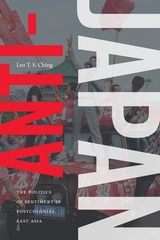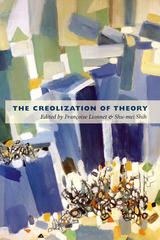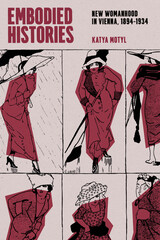2 books by Ching, Leo

Anti-Japan
The Politics of Sentiment in Postcolonial East Asia
Leo T. S. Ching
Duke University Press, 2019
Although the Japanese empire rapidly dissolved following the end of World War II, the memories, mourning, and trauma of the nation's imperial exploits continue to haunt Korea, China, and Taiwan. In Anti-Japan Leo T. S. Ching traces the complex dynamics that shape persisting negative attitudes toward Japan throughout East Asia. Drawing on a mix of literature, film, testimonies, and popular culture, Ching shows how anti-Japanism stems from the failed efforts at decolonization and reconciliation, the Cold War and the ongoing U.S. military presence, and shifting geopolitical and economic conditions in the region. At the same time, pro-Japan sentiments in Taiwan reveal a Taiwanese desire to recoup that which was lost after the Japanese empire fell. Anti-Japanism, Ching contends, is less about Japan itself than it is about the real and imagined relationships between it and China, Korea, and Taiwan. Advocating for forms of healing that do not depend on state-based diplomacy, Ching suggests that reconciliation requires that Japan acknowledge and take responsibility for its imperial history.
[more]

The Creolization of Theory
Françoise Lionnet and Shu-mei Shih, eds.
Duke University Press, 2011
Introducing this collection of essays, Françoise Lionnet and Shu-mei Shih argue that looking back—investigating the historical, intellectual, and political entanglements of contemporary academic disciplines—offers a way for scholars in the humanities to move critical debates forward. They describe how disciplines or methodologies that seem distinct today emerged from overlapping intellectual and political currents in the 1960s and early 1970s, in the era of decolonization, the U.S. civil rights movement, and antiwar activism. While both American ethnic studies programs and “French theory” originated in decolonial impulses, over time, French theory became depoliticized in the American academy. Meanwhile, ethnic studies, and later also postcolonial studies, developed politically and historically grounded critiques of inequality. Suggesting that the abstract universalisms of Euro-American theory may ultimately be the source of its demise, Lionnet and Shih advocate the creolization of theory: the development of a reciprocal, relational, and intersectional critical approach attentive to the legacies of colonialism. This use of creolization as a theoretical and analytical rubric is placed in critical context by Dominique Chancé, who provides a genealogy of the concept of creolization. In their essays, leading figures in their fields explore the intellectual, disciplinary, and ethical implications of the creolized theory elaborated by Lionnet and Shih. Édouard Glisssant links the extremes of globalization to those of colonialism and imperialism in an interview appearing for the first time in English in this volume. The Creolization of Theory is a bold intervention in debates about the role of theory in the humanities.
Contributors. Étienne Balibar, Dominique Chancé, Pheng Cheah, Leo Ching, Liz Constable, Anne Donadey, Fatima El-Tayeb, Julin Everett, Édouard Glissant, Barnor Hesse, Ping-hui Liao, Françoise Lionnet, Walter Mignolo, Andrea Schwieger Hiepko, Shu-mei Shih
[more]
READERS
Browse our collection.
PUBLISHERS
See BiblioVault's publisher services.
STUDENT SERVICES
Files for college accessibility offices.
UChicago Accessibility Resources
home | accessibility | search | about | contact us
BiblioVault ® 2001 - 2024
The University of Chicago Press









